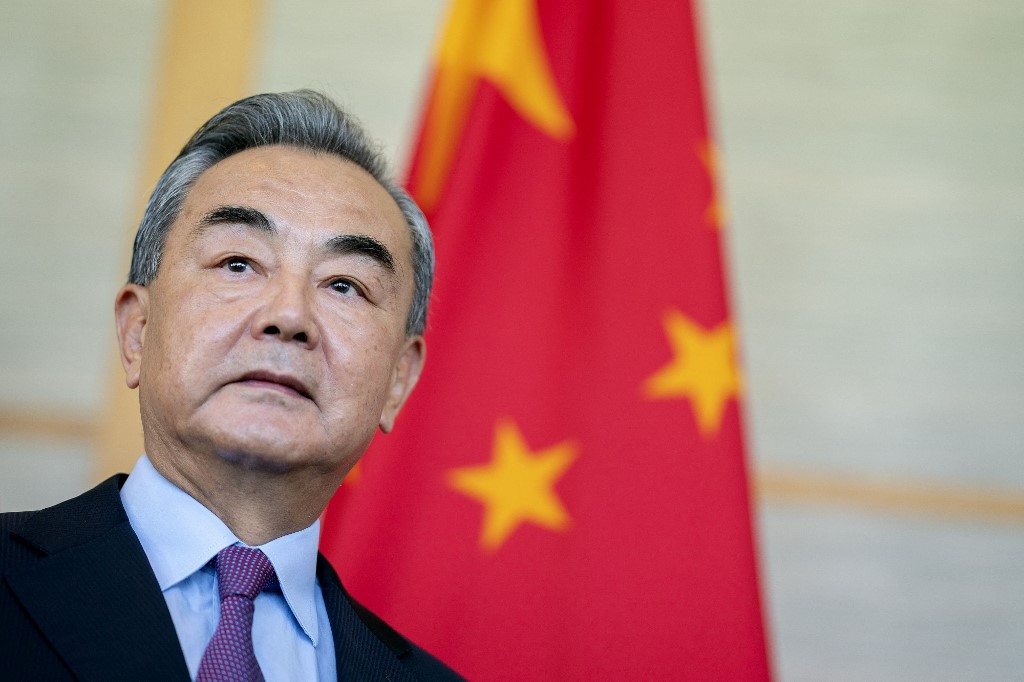Popular Reads
Top Results
Can't find what you're looking for?
View all search resultsPopular Reads
Top Results
Can't find what you're looking for?
View all search resultsBall in US court to keep Asia Pacific stable: China
Beijing says it supports positive interaction, regionalism.
Change text size
Gift Premium Articles
to Anyone

Chinese Foreign Minister Wang Yi said on Monday that regional stability in Asia Pacific depended on what the United States decided in the coming months and warned that the ball was in the US court as to whether to create tensions or de-escalate them in the region.
In a policy speech delivered at the ASEAN secretariat in Central Jakarta, the first public appearance for the senior Chinese diplomat following his meeting with US Secretary of State Antony Blinken, Wang said China was waiting on a response from the US on his proposal for the establishment of rules for positive interactions and the upholding of regionalism in the Asia-Pacific.
"We're looking forward to getting a response from the United States [...] and to see if they can change their hegemonic mentality," Wang said in response to a question from The Jakarta Post on Monday.
Wang also said that China had no imperial ambitions in the region and that it put a premium on stability as a foundation for prosperity.
"We don't want colonialism, we just want prosperity for our people," Wang said.
Wang's statements came only two days after he engaged in a dialogue with Blinken on Sunday on the sidelines of the Group of 20 Foreign Ministers’ Meeting in Nusa Dua, Bali.
Blinken characterized the meeting as "constructive" and that the US was committed to managing its relationship with China responsibly.
China's foreign ministry said in a statement after the meeting that the two sides had arrived at a "consensus" on improving ties.
"The two sides, on the basis of reciprocity and mutual benefit, reached a consensus to promote the Sino-US joint working group consultation to achieve more results," the foreign ministry said in a readout of the meeting.
In his latter part of the speech, Wang however struck a more assertive tone, warning that the US should not seek to change the status quo.
"We should insulate this region from geopolitical calculations […] from being used as chess pieces, from major power rivalry and from coercion," said Wang, who was speaking through a translator.
"The future of our region should be in our own hands," he said.
On the issue of Taiwan, Wang struck a more aggressive tone, warning that a "dark cloud" could soon descend over the region, if the US continued to antagonize China on the Taiwan issue.
Wang said Washington had been "distorting and hollowing out the One China policy", and was trying to play the Taiwan card to disrupt and contain China's development."
"The two sides across the [Taiwan] Strait will enjoy peaceful development. But when the one-China principle is arbitrarily challenged or even sabotaged, there will be dark clouds or even ferocious storms across the strait," Wang said.
Tensions over Taiwan have escalated in recent months with increasing Chinese military aircraft incursions being reported into the island's air defense identification zone (ADIZ).
US President Joe Biden, during a visit to Japan in May, appeared to break decades of US policy when, in response to a question, he said Washington would defend Taiwan militarily if it was attacked by China.
The White House has since insisted that its policy of "strategic ambiguity" over whether or not it would intervene had not changed.
US warships periodically sail through the Taiwan Strait, while British, Canadian, French and Australian warships have all made passages in recent years.
Speaking in Bangkok on Sunday, Blinken said the US expects Biden and Chinese leader Xi Jinping will have the opportunity to speak in the weeks ahead.
However, when asked at a news conference in Thailand if Biden and Xi might hold a first face-to-face meeting as leaders on the sidelines of the G20 Summit in Bali in November, Blinken said he could not say what might happen then.
He said he also could not say who the US would be sending to the APEC summit in Thailand the same month.
"With regard to President Xi and the President Biden, our expectation is that they will have an opportunity to speak in the weeks ahead, and I can't talk to what may happen in the fall," Blinken said, quoted by Reuters.
The White House is considering rolling back some punitive tariffs imposed on China by the Trump administration, but President Biden has said that a review was under way and he had not yet made a decision.










